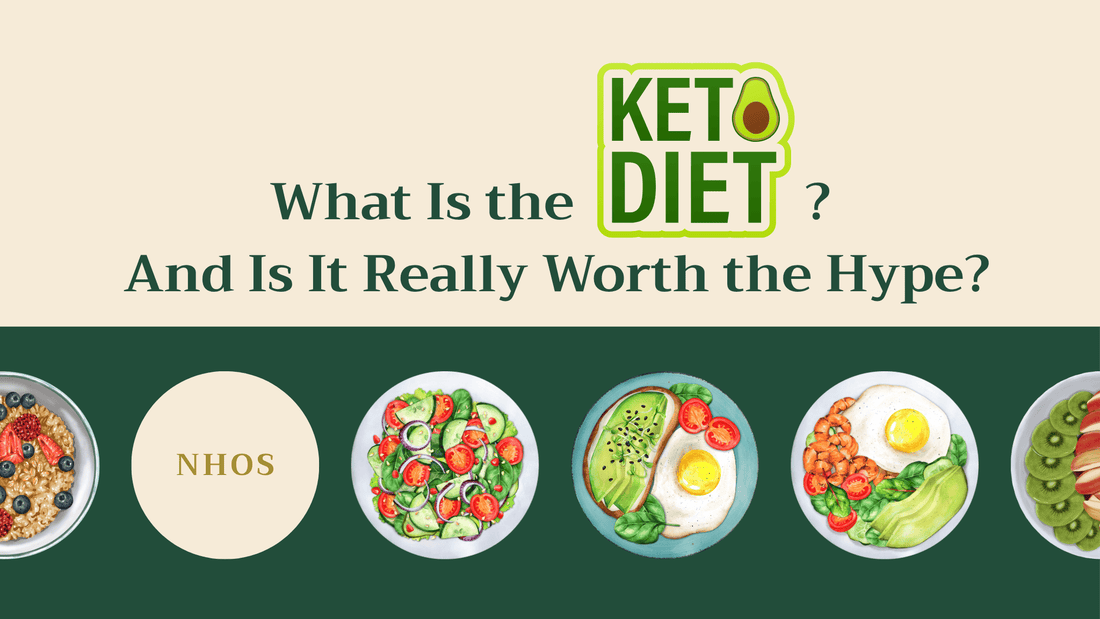
生酮饮食是什么?它真的值得大肆宣传吗?
咖啡里加黄油?每天早餐都吃培根?欢迎来到奇妙的生酮世界。
🥑 那么...生酮饮食到底是什么?
让我们来详细分析一下。生酮饮食(或称“keto”)是一种高脂肪、低碳水化合物和中等蛋白质的饮食计划。它的主要目标是什么?让你的身体进入一种叫做“酮症”的状态,燃烧脂肪而不是碳水化合物来获取能量。
通常情况下,你的身体会利用葡萄糖(来自碳水化合物)作为燃料。但当碳水化合物供应不足时(例如生酮饮食),你的肝脏会开始将脂肪转化为酮体,酮体将成为你新的能量来源。这就像从汽油转换为电池供电一样。
🧠 简要回顾其起源
令人惊讶的是,生酮饮食最初并不是为了减肥而发明的。它诞生于20 世纪 20 年代,最初是作为一种治疗癫痫的方法而发展起来的,尤其适用于对药物治疗无效的儿童。
医生发现,禁食或少量碳水化合物有助于减少癫痫发作。随着时间的推移,这种饮食引起了健康界的关注,并演变成一种流行的(有时也颇具争议的)减肥潮流。
🌟 生酮饮食的潜在益处
很多人对生酮饮食赞不绝口——不仅仅是因为他们可以毫无负罪感地吃奶酪。一些最受关注的好处包括:
✅ 1.减肥
由于身体燃烧脂肪来获取能量,许多人都会出现体重快速下降的情况——尤其是在最初几周。
✅ 2.食欲下降
高脂肪和高蛋白的食物更能让人感到满足,这可以帮助你少吃,而不会一直感到饥饿。
✅ 3.更好的血糖控制
酮可能有助于稳定血糖水平,这对患有 2 型糖尿病或胰岛素抵抗的人来说很有趣(但一定要先咨询医生!)。
✅ 4.提高精神集中度(可能)
一些生酮饮食爱好者表示,“脑雾”现象减少了,可能是因为酮体为大脑提供了稳定的燃料来源。
⚠️ 但这并不全是培根和幸福
虽然生酮饮食对某些人有奇效,但并非人人适用。以下是一些需要注意的事项:
❌ 1.酮流感
在最初的几天里,你的身体会经历碳水化合物戒断反应——例如疲劳、头痛、情绪波动和脑雾。这种反应通常会在一周左右消失,但这并不好受。
❌2.营养缺乏
不吃水果、谷物和部分蔬菜,可能会错过纤维、维生素和矿物质。合理补充营养至关重要。
3.消化问题
便秘很常见,尤其是在纤维摄入量下降的情况下。你的肠道微生物可能不喜欢这种突然的变化。
❌4.可持续性
长期坚持生酮饮食可能很困难。社交活动、旅行,甚至只是想吃烤面包,都可能让严格的碳水化合物限制难以坚持。
🧃 谁不应该尝试生酮饮食?
生酮饮食并非适合所有人。患有肝脏或胰腺疾病、胆囊疾病或某些代谢紊乱的人应避免使用生酮饮食。孕妇或哺乳期女性也应先咨询医疗保健提供者。
如果您与食物的关系很复杂(例如有饮食失调史),严格的饮食有时弊大于利。
🥦 那么...您应该进行生酮饮食吗?
视情况而定。如果你喜欢高脂食物,喜欢制定膳食计划,并且想尝试一些新事物,生酮饮食或许值得一试。但它并非灵丹妙药,也绝对不是保持健康或减肥的唯一方法。
许多人认为更加均衡、灵活的饮食方式很有效,其中包括适量的碳水化合物(比如红薯和糙米)。
💬 最后的想法
生酮饮食或许是一个强大的工具——但就像任何饮食一样,它并非放之四海而皆准。如果你感兴趣,不妨先了解一下,倾听你的身体,或许还可以咨询一下营养师或医生。归根结底,最好的饮食是你能享受、坚持并感觉良好的饮食。
